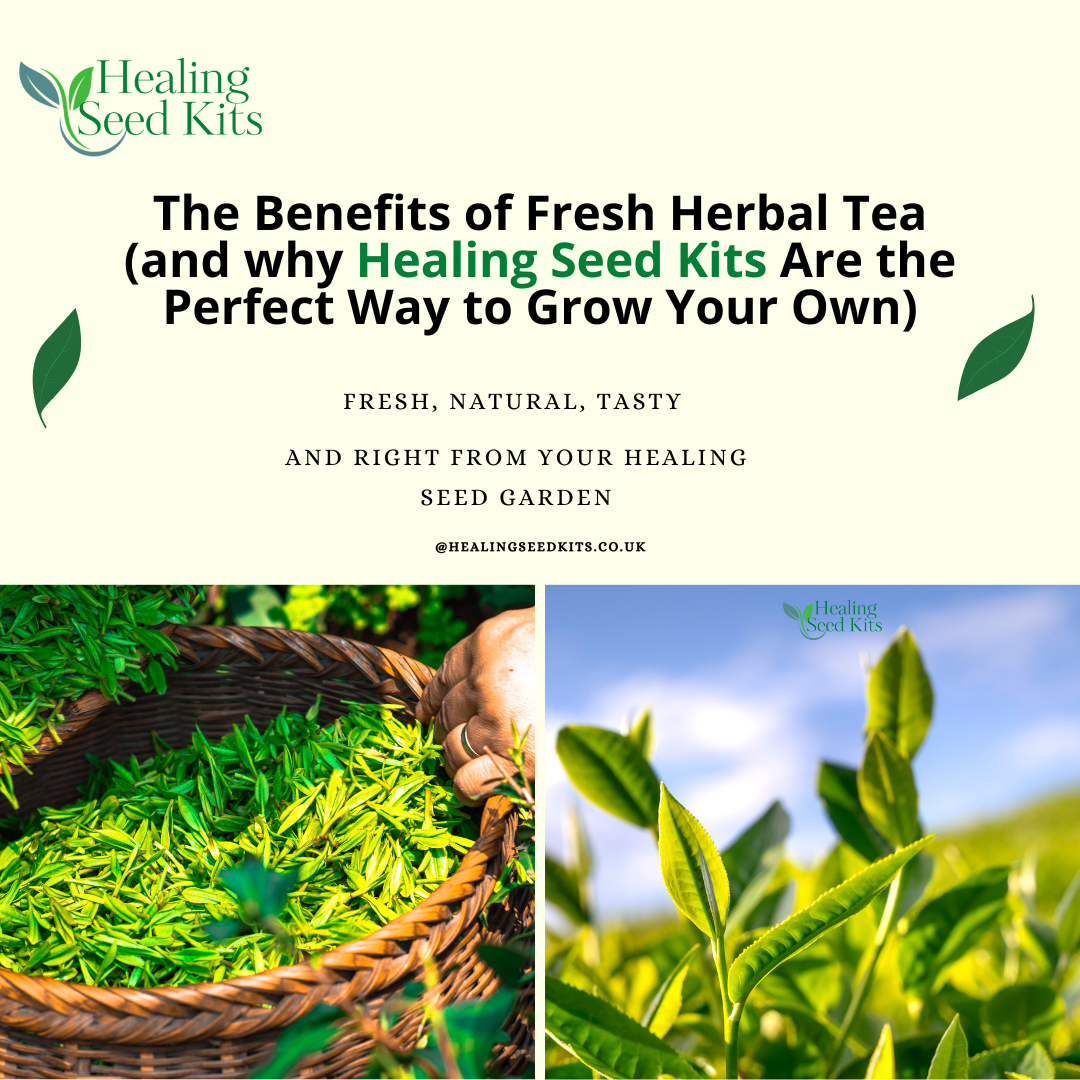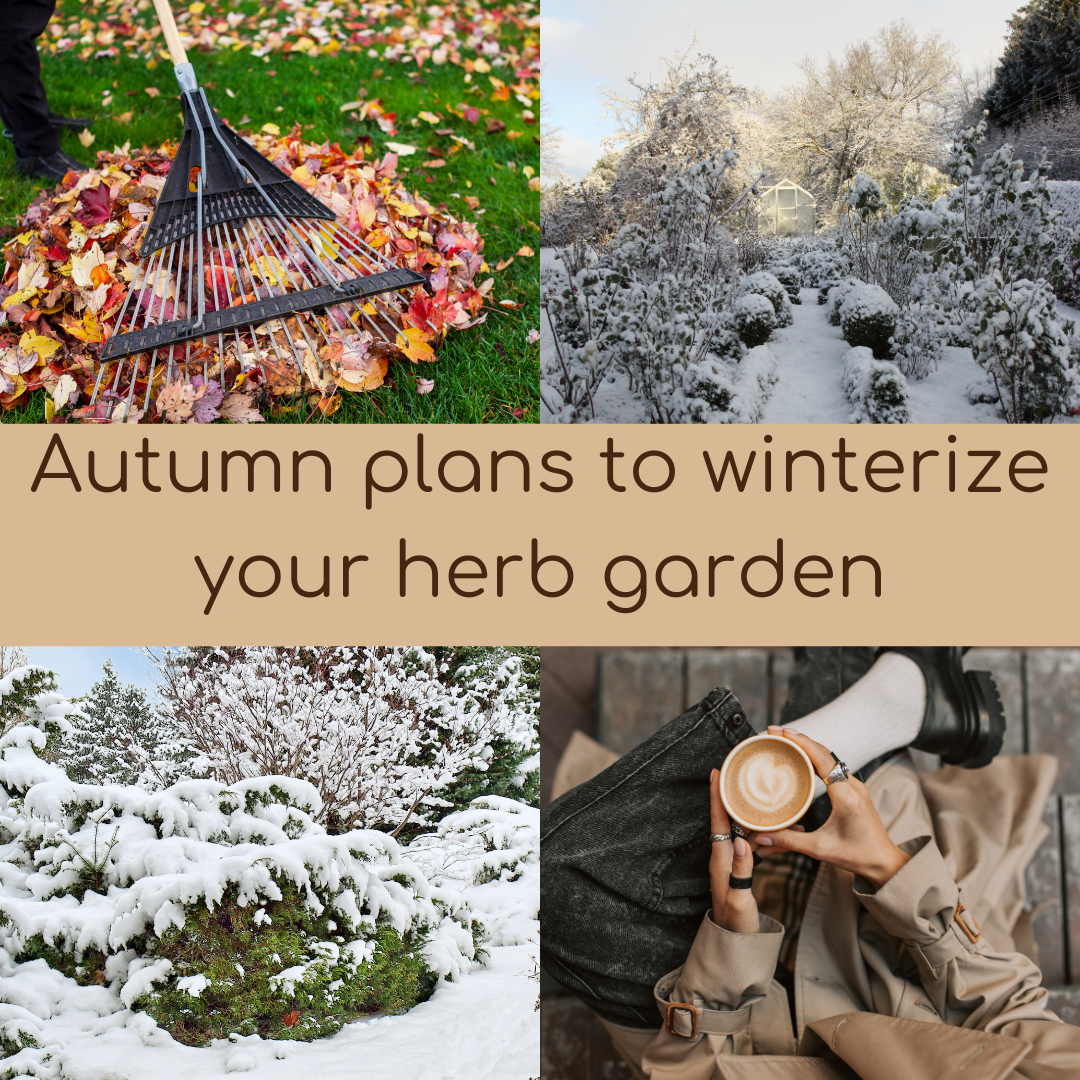As the cooler months approach, your herb garden starts winding down for the winter. For those of you growing with Healing Seed Kits, you've likely seen your garden flourish through the warm season, but now it's time to give it the care it needs to survive the colder months and emerge strong in the spring. A little prep now can make all the difference when it comes to ensuring your plants are healthy and ready for growth once the weather warms up again.
Here are 10 essential steps to help you "winterize" your herb garden. From protecting young plants to harvesting seeds, these tips will keep your garden in great shape through the winter and set you up for a bountiful harvest next year.
1. Bring Potted Herbs Indoors
Herbs in containers are especially vulnerable to frost, so bringing them indoors is the best way to protect them. By moving them into a greenhouse, sunroom, or even a bright window, you can extend their growing season and keep them safe from the cold.
Pro tip: Make sure to check on your indoor herbs regularly, especially to keep them hydrated. Indoor air can be quite dry in the winter, so consider using a humidity tray or misting your plants occasionally.
2. Apply Protective Mulch
To protect your herbs from freezing temperatures, apply a thick layer of mulch around their base. You can use wood chips, straw, or shredded leaves to insulate the soil. Mulching helps regulate soil temperature and provides some protection for plant roots. For extra protection, try using cold frames or cloches to shield your herbs from the harshest frost while still allowing some sunlight in.
Pro tip: Mulch isn’t just for winter—it's also a great way to prevent weeds and improve soil health, so it’s a win-win for your garden all year long.
3. Drain and Store Irrigation Systems
Freezing temperatures can cause serious damage to irrigation systems, so be sure to drain any hoses, pipes, and spray guns before the cold hits. Storing your watering equipment indoors will prevent it from freezing and cracking, saving you from having to replace it next spring.
Pro tip: If you use a garden hose reel, it's a great way to store hoses neatly and prevent them from tangling or getting damaged over winter.
4. Harvest Seeds for Next Year
Now is the time to collect any seeds you want to save for next season. Some herbs, like licorice mint and pokeroot, offer seeds that not only benefit your garden but also provide food for birds during the winter months. If you prefer to control the seeding in your garden, gather up any remaining seeds and store them for the following year.
Pro tip: Store your seeds in airtight containers in a cool, dry place to maintain their viability until you’re ready to plant again.
5. Cut Back Perennial Herbs
Once your perennial herbs start to turn brown, it’s time to prune them back. Cutting them down to the base prevents disease and pest problems and keeps your garden neat over the winter. Plus, if you look closely, you may spot small shoots near the base—signs that your plants are already starting to prepare for the spring.
Pro tip: Leave a few stems if they offer shelter or food to wildlife, such as birds or beneficial insects, during the winter months.
6. Harvest Roots for Teas and Tinctures
Fall is the ideal time to harvest the roots of perennial herbs like echinacea, valerian, and ginseng. Wait until the leaves and stems have naturally died back, signaling that the plant's energy has returned to the roots. If you don’t want to uproot the entire plant, carefully dig around the roots and take only a small portion.
Pro tip: Use a garden fork or spade to gently loosen the soil around the roots, which will help preserve the rest of the plant for next year.
7. Make Leafmould for Future Soil
Instead of letting fallen leaves pile up in your garden, why not turn them into something useful? Leafmould is an excellent soil conditioner that mimics woodland conditions. It’s rich in organic matter, retains moisture, and helps improve soil structure. Just gather your leaves and let them break down in a compost bin or pile.
Pro tip: Leafmould can take up to two years to fully break down, so start your pile now and you’ll have an excellent soil amendment when spring rolls around.
8. Organize and Harvest Compost
Your compost bin is likely full after all the cutting and pruning this season, so now’s the time to check if it’s ready for harvest. If your compost is broken down and ready, dig it out and use it to enrich your soil. If it’s still in the process of breaking down, turn it over and continue to add kitchen scraps and garden waste.
Pro tip: Turning your compost regularly helps speed up the decomposition process and ensures that it breaks down evenly.
9. Divide and Transplant Overgrown Herbs
Autumn is the perfect time to divide perennial herbs that have outgrown their space. Dividing these plants now gives them plenty of time to establish new roots before the colder months arrive. Herbs like mint, oregano, and chives are great candidates for division, and you can use the extra plants to fill in empty spaces or even share with friends.
Pro tip: Be sure to water your divided herbs thoroughly after transplanting to help them settle in.
10. Pot Up or Protect Young Herbs
If you’ve planted young herbs, or if your herbs have self-seeded late in the season, pot them up now to protect them from the winter chill. Alternatively, you can mark their location with stakes or plant markers to avoid accidentally disturbing them while preparing your garden for winter.
Pro tip: A simple plant marker or flag can help you keep track of where your young plants are, ensuring they’re not accidentally uprooted while you're tidying up the garden.
Final Thoughts: Preparing for Winter’s Chill
With these 10 simple tips, you can give your herb garden the protection it needs to survive winter and come back strong in the spring. Whether you're protecting young plants, harvesting seeds, or making leafmould, taking a little time now will pay off big next season. So, take care of your garden now, and it will reward you with lush growth when the warmer weather arrives.
Happy gardening, and stay warm!





Leave a comment
All comments are moderated before being published.
This site is protected by hCaptcha and the hCaptcha Privacy Policy and Terms of Service apply.